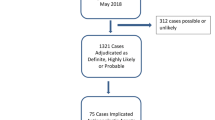Abstract
Severe hyperlipidaemia with asparaginase therapy is rare. We report six cases, four of which developed significant problems with severe hyperlipidaemia during induction therapy for ALL and lymphoblastic lymphoma. The median triglyceride level was 22.3 mmol/L and the median cholesterol level was 12.3 mmol/L. None of the patients showed signs or symptoms of pancreatitis. Three children were re-exposed with Peg asparaginase, and one with Erwinia asparaginase, without recurrence of hyperlipidaemia or other symptoms. These cases highlight the dilemma in managing such rare cases of symptomatic hypertriglyceridaemia secondary to asparaginase and steroid therapy.
Similar content being viewed by others
References
Silverman LB, Gelber RD, Dalton VK, et al. Improved outcome for children with acute lymphoblastic leukemia: results of Dana-Farber Consortium Protocol 91–01. Blood. 2001;97:1211–8.
Oettgen HF, Stephenson PA, Schwartz MK, et al. Toxicity of E. coli l-asparaginase in man. Cancer. 1970;25:253–78.
Vora A, Wade R, Mitchell C. Efficacy, toxicity of pegylated asparaginase in the treatment of children, young adults with acute lymphoblastic leukaemia: results of the United Kingdom Medical Research Council (MRC) trial UKALL 2003. Blood. 2008;112:337.
Rosenson RS, Shott S, Tangney CC. Hypertriglyceridemia is associated with an elevated blood viscosity Rosenson: triglycerides and blood viscosity. Atherosclerosis. 2002;161:433–9.
Yadav D, Pitchumoni CS. Issues in hyperlipidemic pancreatitis. J Clin Gastroenterol. 2003;36:54–62.
Qureshi A, Mitchell C, Richards S, et al. Asparaginase-related venous thrombosis in UKALL. Br J Haematol. 2010;149:410–3.
Parsons SK, Skapek SX, Neufeld EJ, et al. Asparaginase-associated lipid abnormalities in children with acute lymphoblastic leukemia. Blood. 1997;89:1886–95.
Cohen H, Bielorai B, Harats D, et al. Conservative treatment of l-asparaginase-associated lipid abnormalities in children with acute lymphoblastic leukemia. Pediatr Blood Cancer. 2010;54:703–6.
Steinherz PG. Transient, severe hyperlipidemia in patients with acute lymphoblastic leukemia treated with prednisone and asparaginase. Cancer. 1994;74:3234–9.
Medical Research Council working party on Leukaemia in children, UK National randomised trial for children and young adults with acute lymphoblastic leukaemia (ALL). 2003. http://www.ctsu.ox.ac.uk/projects/leuk/ukall2003, UK ALL 2003 Version 7.
Wynn DR. Euro- LB 02 Treatment protocol for T-cell and B-precursor cell lymphoblastic lymphoma of the European Inter-group Co-operation on childhood non-Hodgkin-lymphoma (EICNHL), UKCCSG Study. 2004. http://public.ukcrn.org.uk/search/StudyDetail.aspx?StudyID=1480.
Sharma P, Lim S, James D, et al. Pancreatitis may occur with a normal amylase concentration in hypertriglyceridaemia. BMJ. 1996;313:1265.
Halton JM, Nazir DJ, McQueen MJ, Barr RD. Blood lipid profiles in children with acute lymphoblastic leukemia. Cancer. 1998;83:379–84.
Toskes PP. Hyperlipidemic pancreatitis. Gastroenterol Clin North Am. 1990;19:783–91.
Knoderer HM, Robarge J, Flockhart DA. Predicting asparaginase-associated pancreatitis. Pediatr Blood Cancer. 2007;49:634–9.
Treepongkaruna S, Thongpak N, Pakakasama S, et al. Acute pancreatitis in children with acute lymphoblastic leukemia after chemotherapy. J Pediatr Hematol Oncol. 2009;31:812–5.
Bagdade JD, Porte D, Bierman EL. Steroid-induced lipemia. A complication of high-dosage corticosteroid therapy. Arch Intern Med. 1970;125:129–34.
Hoogerbrugge N, Jansen H, Hoogerbrugge PM. Transient hyperlipidemia during treatment of ALL with l-asparaginase is related to decreased lipoprotein lipase activity. Leukemia. 1997;11:1377–9.
Ewald N, Hardt PD, Kloer HU. Severe hypertriglyceridemia and pancreatitis: presentation and management. Curr Opin Lipidol. 2009;20:497–504.
Belay B, Belamarich PF, Tom-Revzon C. The use of statins in pediatrics: knowledge base, limitations, and future directions. Pediatrics. 2007;119:370–80.
Conflict of interest
None.
Author information
Authors and Affiliations
Corresponding author
About this article
Cite this article
Lashkari, H.P., Lancaster, D., Atra, A. et al. Symptomatic severe hypertriglyceridaemia with asparaginase therapy in acute lymphoblastic leukaemia (ALL) and lymphoblastic lymphoma: is rechallenging safe?. Int J Hematol 94, 571–575 (2011). https://doi.org/10.1007/s12185-011-0966-9
Received:
Revised:
Accepted:
Published:
Issue Date:
DOI: https://doi.org/10.1007/s12185-011-0966-9




